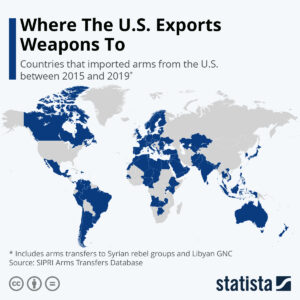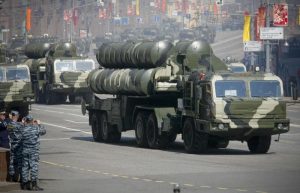The ongoing wars between Russia and Ukraine and Israel and its various Arabic enemies brings forward the question of a nation’s right to defend itself. At least it does so for me and that’s why I’m writing this post. It’s an important question for people of the United States for a couple of reasons.
We provide weapons to Ukraine and Israel and restrict how they can be used. President Biden recently announced that the Ukraine can use missiles to strike deep into Russia after having long banned the practice. Meanwhile there are few restrictions on how Israel uses its U.S. made weapons.
What is the role of the United States in all of this? A fair and complicated question.
Absolutist Position One
It seems almost self-evident that a nation’s right to defend itself is without limits. When involved in war, there are few, if any limits. A nation must be able to defend itself using all available means.
Absolute Position Two
Our weapons are being used and the United States has every right to restrict how those weapons are used in a nation’s right to defend itself. If we tell a country not to use weapons in a specific way, then they must abide by those rules. After all, without our weapons they would largely be unable to defend themselves at all.
The Nuanced Position
The pragmatic position is far more difficult. Yes, we provide many of the weapons. Yes, a country is fighting for its existence. But there are global ramifications to both wars. The conflicts have the potential to spiral into larger wars. Could the entire Middle East become embroiled in war? All of Europe? Even the entire world? Are nuclear attacks completely off the table?
What are the long-term ramifications if Ukraine is destroyed, Isreal?
When a country uses weapons made in the United States there is always the potential for errors. A bomb meant for a military target might hit a school or a hospital. These are almost inevitable outcomes in the horrors of war. Children are dying in both conflicts.
It is only fair and reasonable that U.S. taxpayers who, after all, paid for all these weapons, have some say in how they are used. There are many in the United States who sympathize with both Israel and Ukraine. There are others less sympathetic and politicians are wise to consider these sentiments when restricting the use of such weapons.
My Opinion on a Nation’s Right to Defend Itself
I suppose that’s enough waffling about on the issue. I think a nation’s right to defend itself is unlimited. If they choose methods that turn their allies away from their cause, so be it. Yes, there are enormous global consequences to both conflicts but I don’t think the United States should be telling other nations how to defend themselves anymore than I think other nations should be telling the United States how to do so.
This, of course, leads me to my idealistic position.
We Shouldn’t have to ask this Question
We produce far too many weapons in this country. Far more than are needed for our defense and at an enormous price tag to the U.S. taxpayer. We sell huge numbers of our weapons to warring nations and blood is all over our hands. We are steeped in the blood of other nations and it is distressing to this Libertarian.
George Washington said it best in his Farewell Address where he advises against foreign entanglements. His reasoning is superb, and I recommend everyone read the Wikipedia summation of his thoughts.
Tom Liberman


